Diana Calderon: In Her Own Words
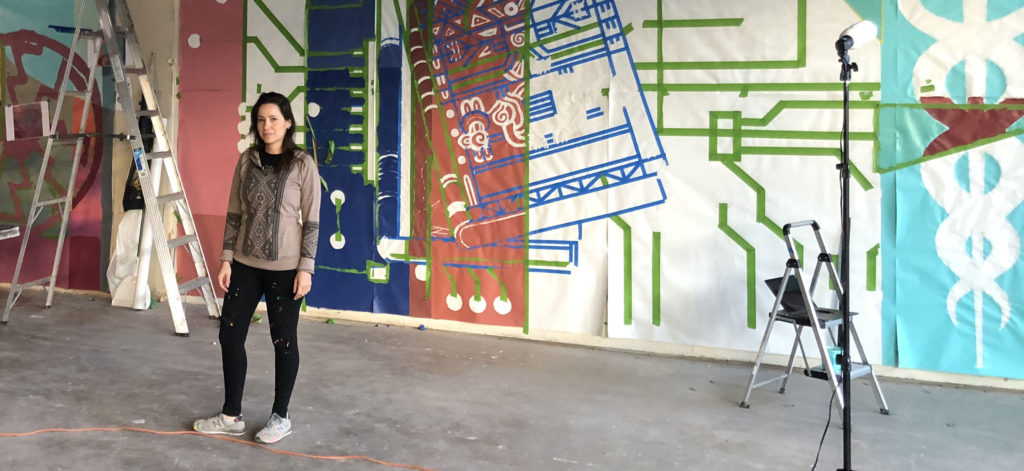
Nov, 09, 2021
ArtistsCommunityPhxArtist Spotlight
Diana Calderon: In Her Own Words
Born in Chihuahua, Mexico, interdisciplinary artist Diana Calderon was raised in the borderlands of El Paso, Texas, and Ciudad Juarez. She moved in 2004 to Phoenix to attend the Herberger Institute for Design and the Arts at Arizona State University and since then has exhibited art across the Valley of the Sun. She’s also an arts educator, dedicated to bringing the transformative power of art to others.
Calderon works primarily in printmaking and performance art to create dynamic, thought-provoking works that explore her heritage, with a particular focus on examining how crossing borders and barriers informs identity and human connections. Here’s Diana Calderon, in her own words, on her motivations, future exhibitions, and a recent performance-art project that took on new life during the pandemic.
“My artwork investigates my ancestral roots and my physical, mental, and spiritual journey as an immigrant.”
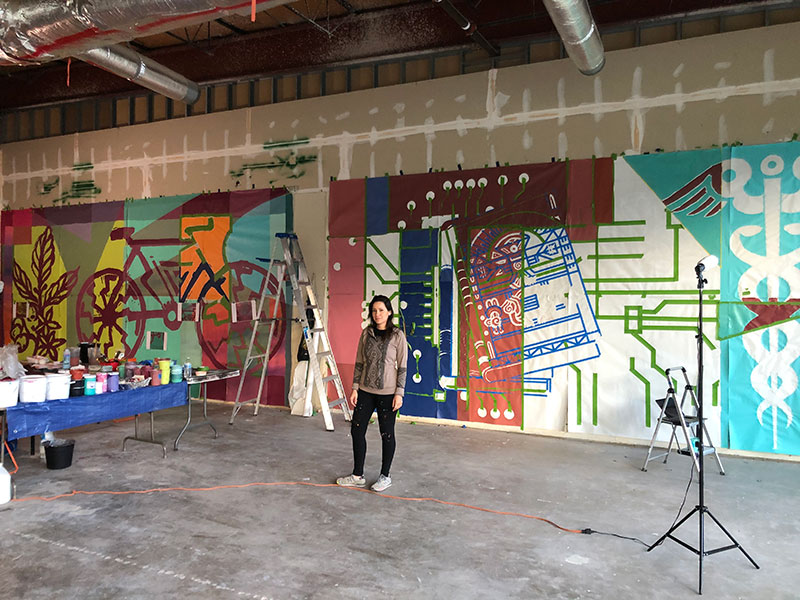
Diana Calderon, The New Archive studio work – at Park Centra, 2021. Mural; paint on mural cloth. Photo: Olga Bracamontes.
PhxArt: Tell us about when you first knew you wanted to be an artist and your motivations for continuing to create.
Diana Calderon: At a very early age, I started experimenting with anything I could create or build with my own hands; I enjoyed learning all of the visual art media and disciplines. I wanted to grow up to become an architect and a therapist, and instead, I became an interdisciplinary artist and am also a School Leader [7th and 8th grade school principal] at a charter school in South Phoenix.
My motivation to continue growing and creating comes from mortality motivation, or the realization that life is short and we can die at any given moment, so why not now, why not me. I’m also motivated by the feeling of responsibility to continue my work in the arts and in education. I currently mentor others as well as serve as a member of the Artlink Artist Council. My family also constantly motivates me to work hard.
PhxArt: What are the media that you prefer to work in?
DC: My current artwork can be described as a form of abstract documentation, or abstract writing in “pages or books” within a blend of traditional and contemporary techniques such as sculptural installation, public and performance art, and sometimes murals. My work has evolved after many years of exploring various disciplines, including drawing, painting, bookmaking, and relief printmaking.
PhxArt: What are some topics you explore in your work?
DC: My artwork investigates my ancestral roots and my physical, mental, and spiritual journey as an immigrant. In my youth, my journey often felt I was living an internship, growing and learning life skills without a sense of belonging. I often felt like an outcast, displaced. My works reference archaeological and architectural patterns and textures and use materials from Mexico and the United States. For the past few years, my body of work has focused on creating identity-informed pieces that explore processes and breaking traditional instruction and personal filters. This is true, for example, for my entire Verbo Transitivo body of works, some of which are featured here.
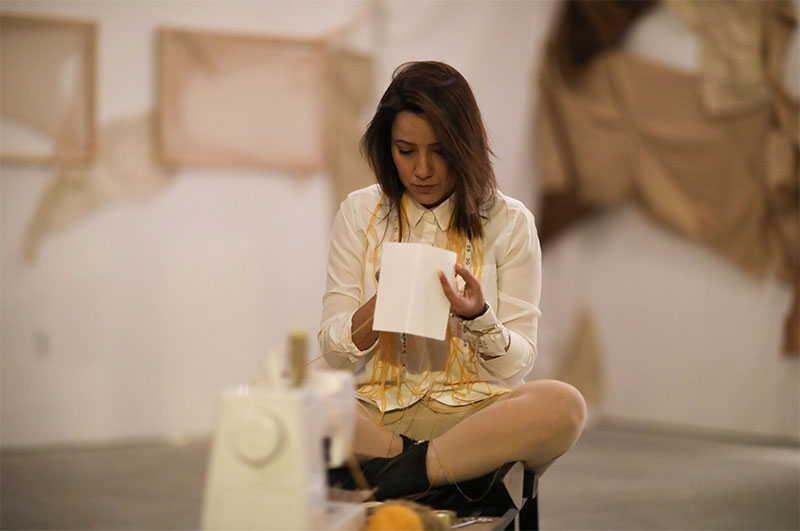
Diana Calderon, Verbo Transitivo #4, 2020. Durational performance art. Photo: KatieAnn Franklin.
PhxArt: Who are your greatest artistic influences?
DC: There are too many to mention—other artists, teachers, mentors, even students I have taught truly influence me. Brave souls expressing their true authentic self, por ejemplo Juan Gabriel really inspired me. Exploring collective and personal healing and therapies as well as consciousness influence me to create.
PhxArt: What are some works or series you’re currently working on or have recently exhibited?
DC: Two of my favorite pieces created within the last year are The New Archive and Invitation to Connect. I collaborated with two other artists, Edgar Fernandez and Miguel Godoy, to design The New Archive public art mural project, located on the street view of the Catalina Parking Garage in Park Central Phoenix. The mural design reflects a cultural landmark that explores the history, culture, and wildlife of Phoenix, as well as the community and mid-century-modern architecture. It also pays homage to the ancestral Huhugam people. The design is an abstract fusion of four words that represent the core values of this project, which are community, education, health, and equity. We also wanted to represent other present and future values and industries, such as healthcare, education, local businesses, technology, art, and design.
Invitation to Connect is an interactive performance artwork and installation. In this work, the viewer is invited to connect, or to become a connectee, and to become a part of the art or history. I stand still behind a transparent wall, or barrier, and with one hand on the plexiglass and a pencil in my other hand, I initiate connection. The participant decides the length of their connection. Once a connection is made, I draw a section of the face of the connectee directly onto the plexiglass wall to document the connection. The first version of Invitation to Connect was born in December 2015, at a time when I was investigating disconnection during my first semester of graduate school. I had 15 participants, and five of them emailed me a write-up describing their connection experience. It was a mixed response and very eye opening.
With this piece, I am most curious about people’s connections and/or lack of connections. The divider I designed and created is my interpretation of a life-size, accordion-style book, and it serves to record or document the connection onto the plexiglass “pages.” Invitation to Connect has been exhibited at the Artlink Annual Juried Exhibition, FOUND:RE Contemporary, ASU Art Museum’s Pilot Projects, and Modified Arts.
Another project I am currently presenting is a workshop titled Patrones Transitivos : Transitive Pattern. It welcomes participants or artists working in all disciplines and guides them to help them create identity-informed pieces that explore processes, including breaking traditional instruction and personal filters. The purpose of this workshop is to become more in tune with your own making process. The workshop was recently taught at Arrowmont School of Arts and Crafts, and I will soon be opening up some workshops in the coming months.
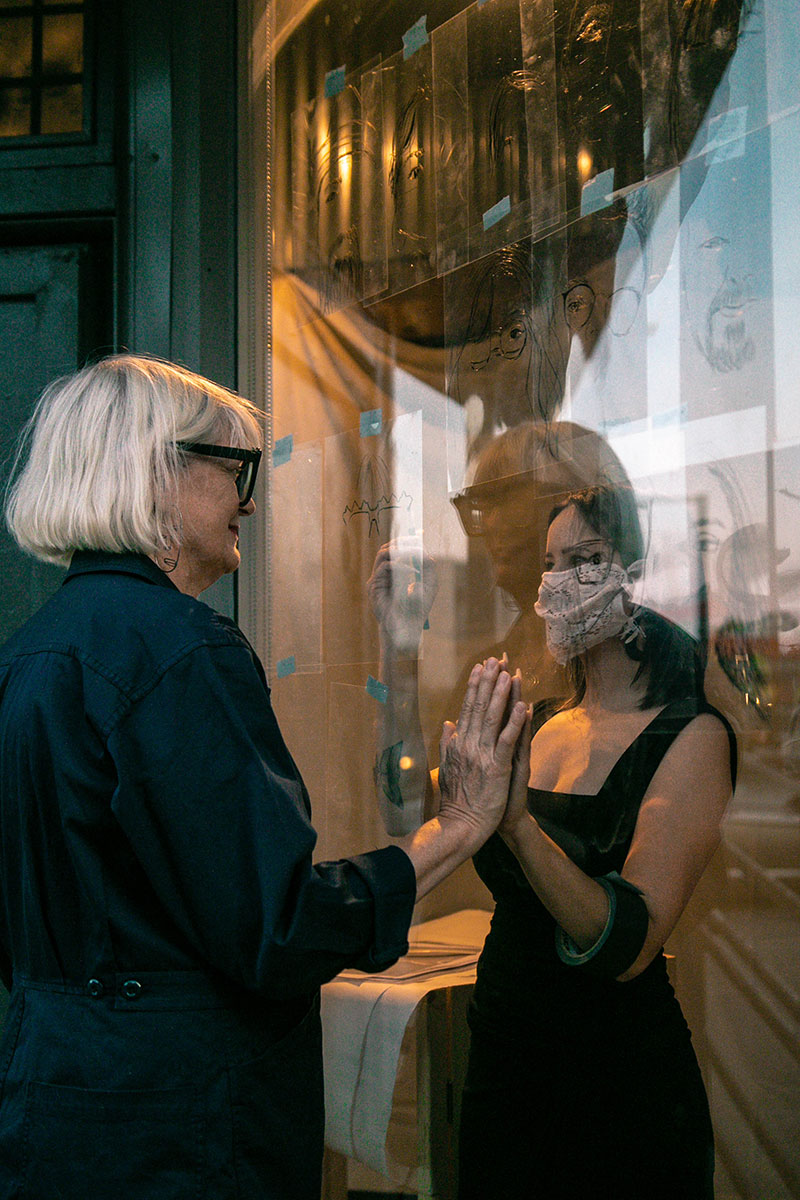
Diana Calderon, Invitation to Connect – at Modified Arts, 2021. Durational interactive performance art. Photo: Josaphat Zelaya.
PhxArt: What does Invitation to Connect mean to you and others particularly now during the COVID-19 pandemic?
DC: Invitation to Connect during the COVID-19 pandemic became more meaningful to me, since people were coming out to public spaces again. Being allowed to visually connect and document each connection, with pencil, has been an honor. I am currently working on collecting more connections to include in a larger-scale installation, or “abstract book.”
Here’s a response from someone after their connection:
“It was a simple yet profound experience. Diana took our current circumstances of ‘separation’ and transcended it into an ‘invitation to connect.’ Where she truly ‘sees you,’ as your hands meet, she draws you on the very surface that separates you. Throughout the experience, I felt simultaneous vulnerability and trust. As my anticipation rose, I thought, “How does she see me and will it be how I see me?’ The answer became very clear once my eyes met the finished product, a connection was made…she manifested my essence, capturing it perfectly using a clear surface and a writing utensil. A true artist. It was truly an amazing experience! Simple yet profound. She saw me and that’s exactly what connected us.”
PhxArt: What’s some advice you have for burgeoning artists?
DC: Focus on creating work. Do not get discouraged by comparing yourself to other artists, or fall into scarcity thinking, or focus on impostor syndrome. Keep making work without personal judgment, seek mentors, take risks, create goals and work toward them, and have patience and self-compassion. Learn to be better, and ask for and take feedback. Invest in taking a workshop, a new class, and professional development. Keep going. Believe in yourself!
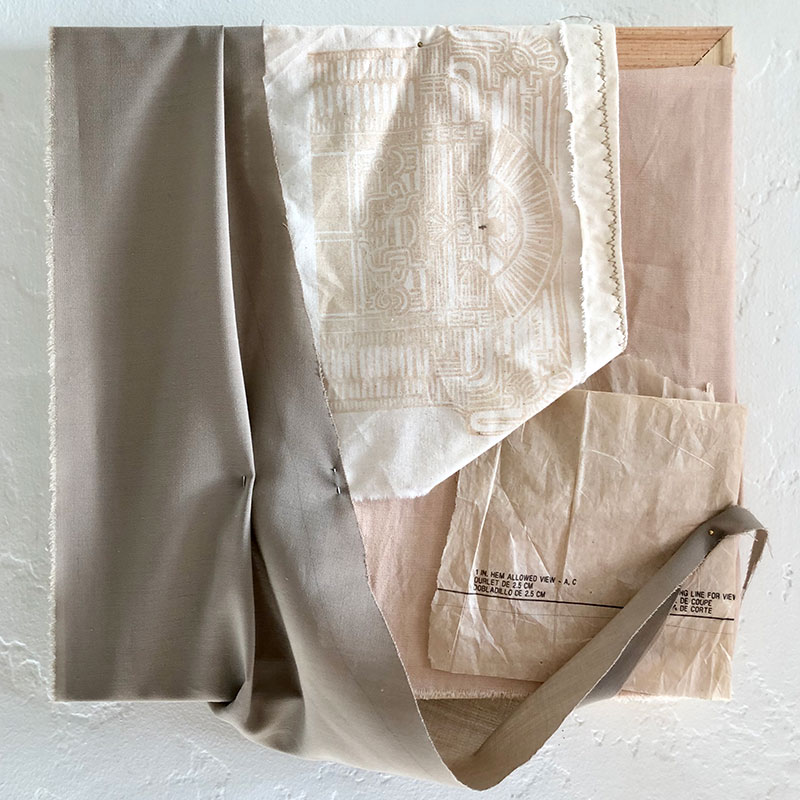
Diana Calderon, Investigación 4 of 4, 2020. Mexican and American paper, cloth, ink (linocut), thread, pins, nails, wood. Photo: Diana Calderon.
PhxArt: What can our community expect to see next from you?
DC: I am working on creating a new installation using the documentation (transparency sheets) from Invitation to Connect. The exhibition location is to be determined. Then in March 2022, Invitation to Connect will be exhibited at Barrow Neurological Foundation in their Neuro Night event at their brand-new global headquarters, the Neuroplex. My abstract book divider will be auctioned off at a live auction hosted by Sharon Stone, the Neuro Night honoree.
SEE MORE
To see more work by Diana Calderon, visit www.calderonArte.com or follow her on Instagram @dianaAcalderon1.
#CreativeQuarantine
We’re curious how creatives are navigating the time of coronavirus. Diana Calderon shares what’s giving her life during the pandemic.
DC: During the pandemic, I’ve found inspiration in family, community, work, plants, my dog, nature, riding my bike, listening to audio books, and creating art.
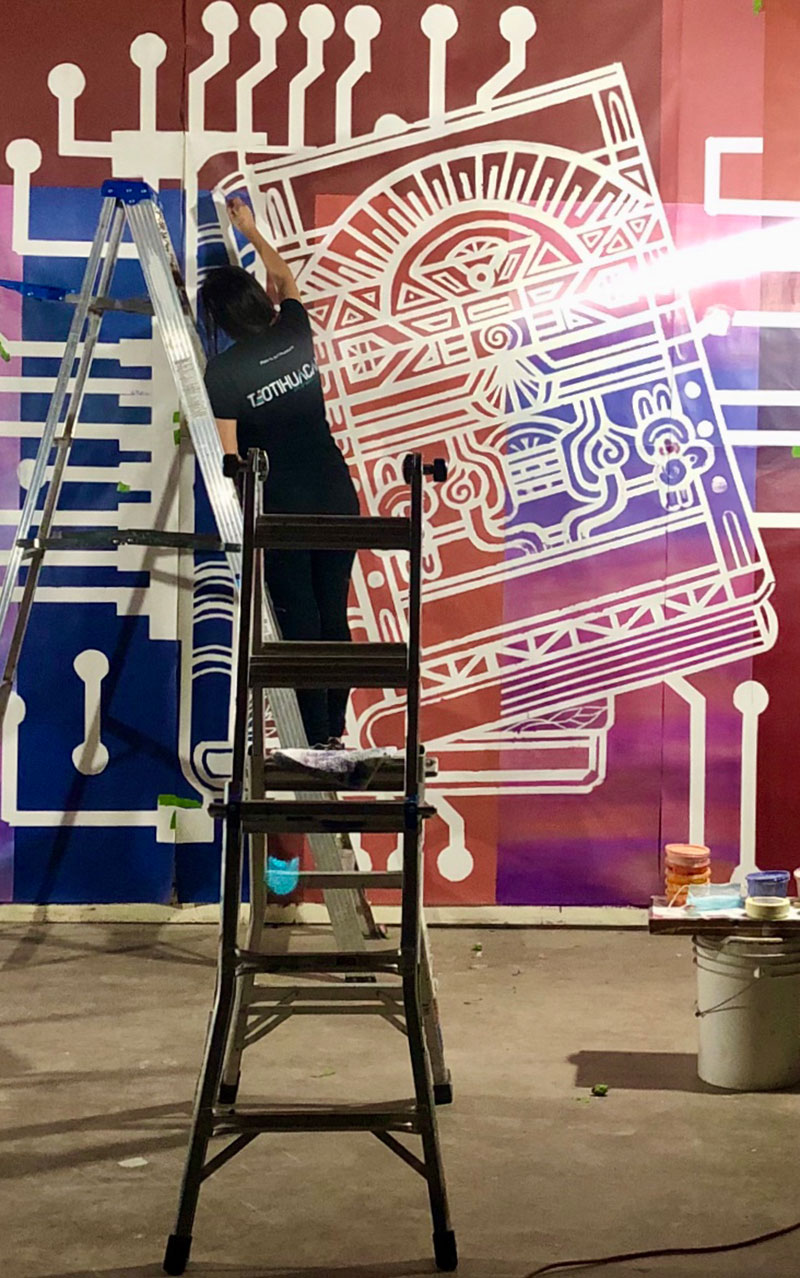
Diana Calderon, The New Archive studio work, 2021. Mural; paint on mural cloth. Photo: Olga Bracamontes.
Categories
What can we help you find?
Need further assistance?
Please call Visitor Services at 602.257.1880 or email